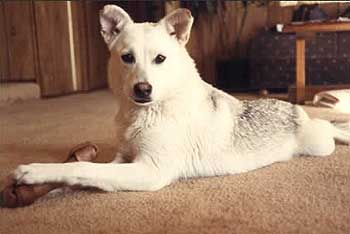Do pets go to Heaven?
Some thought-provoking answers to the age-old question.
By Michelle Shannon

Our dog, Sable, died late last night, May 24, 1998. She was just over 9 years old.
We had taken her to the vet on May 18, just six days earlier, and a tumor was found. But the vet said she was otherwise in great health. So, we decided to have the tumor removed after our camping trip that weekend.
When we returned Sunday, Sable was dying. She struggled to greet my husband, Steve, and then slumped down, breathing laboriously. She would not get up again.
We knew she would not make it through the night, so we stayed with her, gently stroking her fur and scratching her favorite places, until she was gone — just before midnight.
What a blessing it was to us to be able to be there for her in her last moments. We are greatly comforted that she was not alone.
Seeking an Explanation
It’s been a long time since we lost a pet. This time, though, we had a 5-year-old who would need an explanation. But, we knew what to say. It would be “easy,” regardless of our tears because we ourselves believed what we would say: “Yes, honey, Sable is in heaven with the Lord Jesus, and He is taking great care of her. And, yes, one day we will see her again.”
Over the past few years, it has been very disappointing to hear what other Christians have to say about animal death. One source said, in referring to the New Earth (our eternal abode), “there will be no animals at all…” Another said, “The Bible does not give us any reason to say yes to the question of whether or not a pet goes to heaven.”
Well, I have a problem with these conclusions. While it is true that the Bible is about Man, not animals, and that there is much about animals we are not told, God has given us just enough to comfort us.
God cares for the animals He created:
- Revelation 4:11 tells us that all things were created for God’s pleasure.
- Matthew 10:29 says that even when a little sparrow falls to the ground, God notices.
- Luke 12:6 says that God never forgets about the animals.
- Psalm 104:21-30 and Matthew 6:26 describe how God Himself feeds the animals.
- Proverbs 12:10 declares that a righteous man cares for the needs of his animals.
- Job 12:10 assures us that “In His hand is the life of every creature.”
Man’s sin brought death and suffering to animals. God had decreed in Genesis 1:29-30 that green plants and fruit were to be the diet for all creatures. People and animals alike were to be strictly herbivores. Carnivorous activity necessitates death and suffering, which, of course, in the beginning, would have had no part in the beautiful creation God had called “very good” (Genesis 1:25).
Man was given the responsibility of serving as overseer of the animals. In fact, it wasn’t until after the flood experienced by Noah that animals became afraid of people (Genesis 9:2). When Man chose to rebel against God, Man brought down not only himself but also all those for whom he was responsible. In Genesis 3:17 God told Adam: “Cursed is the ground because of you…” According to Hosea 4:3 this curse affected animals too: “Because of [the sins of Man], the land mourns, and… the beasts of the field and the birds of the air and the fish of the sea are dying.” Paul confirmed this in Romans 8:20 when he wrote: “For the creation was subjected to frustration, not by its own choice, but by the will of the one who subjected it…”
But there is good news! Animals share in and even look forward to the redemption of Mankind accomplished by Jesus on the Cross. Because God cares for His animal creations, as seen above, they also reap the benefits of the redeeming Cross of Jesus. When He returns, the creation will be restored to its original “very good” state, and carnivorous activity will cease. This promise is found in Isaiah 11:6-11 where God says, “the wolf will live with the lamb, the leopard will lie down with the goat, the calf and the lion and the yearling together, and the lion will eat straw like the ox… They will neither harm nor destroy on all My holy mountain for the earth will be full of the knowledge of the Lord…” (Isaiah 65:25).
In his allegorical book, The Great Divorce, C. S. Lewis gives us a beautiful picture of a redeemed lady arriving in Heaven with a glorious processional of animals. An observer asks his angelic teacher:
“And how… but hullo! What are all these animals? A cat — two cats — dozens of cats. And all those dogs… why, I can’t count them. And the birds. And the horses.”
“They are her beasts.”
“Did she keep a sort of zoo? I mean, this is a bit too much.”
“Every beast and bird that came near her had its place in her love. In her they became themselves. And now the abundance of life she has in Christ from the Father flows over into them.”
I looked at my teacher in amazement.
“Yes,” he said. “It is like when you throw a stone into a pool, and the concentric waves spread out further and further. Who knows where it will end? Redeemed humanity is still young, it has hardly come to its full strength. But already there is joy enough in the little finger of a great saint such as yonder lady to waken all the dead things of the universe into life.”1
And, so, Sable, we know exactly where you are… in the caring palm of your Maker, bringing Him the pleasure for which you were created.
We look forward to seeing you in our processional.
Michelle Shannon lives in Houston, Texas. She is the mother of three children. She and her husband, Steve, attend First Baptist in Houston.
Some Afterthoughts by Dr. David R. Reagan

Michelle Shannon’s love story about her dog really touched my heart, and I decided immediately to share it with you, the reader. Consider it a special Christmas present from me to you.
I guess, in part, the reason it impacted me so strongly is because I am such a dog lover. I have always had a dog as long ago as I can remember.
I currently have two. Both are miniature dachshunds. One is light tan and long-haired; the other is a black and tan short-haired. The long-haired one is named Samson. Like his namesake, he is feisty and hyper-active. He is constantly on the move, surveying his back yard domain, protecting it from any and all intruders, particularly the pesky mockingbirds who love to tease him. He barks non-stop.
The older dog is Zack, short for Zachias. He is the opposite of his adopted younger brother. He is calm, cool, collected, and sedentary. He lies in his bed all day and watches in amazement as Samson huffs and puffs around the yard. On rare occasions — usually when the trash truck comes down the alley — Zack will lift up his head and let go with one deep, resonating bark. At the same moment, Samson is trying to climb the fence and is yelping hysterically.
It’s amazing to me what distinctive personalities animals can have. I praise God for creating them, and I thank Him for the joyful companionship that they provide.
The God of Creation
Michelle is convinced that animals go to Heaven. She may be right. The eternal fate of animals is a question the Bible does not directly answer.
As Michelle points out, God loves His creation, including the animals, and He is determined to restore all of creation — both the plant and animal kingdoms — to the original perfection they enjoyed before being corrupted by the sin of Man.
Jesus died not only to redeem Mankind, but to redeem the creation. This was emphasized prophetically in the Hebrew Scriptures in two ways. First, it was taught symbolically. When the High Priest would enter the Holy of Holies once a year to sprinkle blood on the mercy seat of the Ark of the Covenant, the book of Leviticus tells us that he would take a step back and sprinkle some of the blood on the ground in front of the Ark (Leviticus 16:15).
Why did he do this? The blood on the mercy seat was a prophecy that one day the blood of the Messiah would make it possible for the grace of God to cover the law of God (the tablets of law rested in the Ark under the lid called the mercy seat). The blood on the ground was a prophecy that the sacrifice of the Messiah would also make it possible for God to lift the curse that rests on creation and redeem all of it to its original perfection.
We know for certain that animals will exist on earth during the millennial reign of Jesus (Isaiah 11:6-9), and we are told that all animals will become herbivorous once again. The wolf will lie down with the lamb. The lion will eat straw with the ox. A little child will play in the cobra’s hole because the cobra will no longer be poisonous (Isaiah 11:8). I have a picture of the “peaceable kingdom” hanging behind my desk. It shows a little boy in a white robe walking down a road with a lion on a leash. The lion will be a pet instead of a threat.
The Bible tells us very little about the eternal state that will follow our Lord’s millennial reign. All we know is that the redeemed will live in new bodies on a new earth in the presence of Almighty God, serving Him and experiencing intimate fellowship with Him. The book of Revelation says we will “see his face” (Revelation 22:4). Animals are not mentioned in the eternal context.
But that does not mean they will be absent. I suspect that one of the many delightful surprises God will give to the redeemed will be the joyful companionship of the pets they knew and loved here on this earth. I hope so.
Note: Since this article was written, Dr. Reagan’s older dog, Zack, has died. Zack loved to curl up beside Dr. Reagan as he sat on the couch in his study and wrote in his prayer journal each morning. It’s during those morning devotionals that Dr. Reagan now misses Zack the most.
An Exhortation by Nathan E. Jones
Rolph, named for the “rolph!” sound he made when barking, was my boyhood pet dog. I found the stray puppy outside our home on a spaghetti night and skipped the meal to make a new best friend. He grew up to be a big, lovable part of the family.
With nearly half of the homes in the U.S. having pets according to a 2004 ABCNews/Beliefnet poll, this question is a bone chewed on by many pet lovers. Nearly 9 in 10 of those surveyed believe there is a heaven. When the poll went on to ask if pets also go to heaven, 43% responded yes, 40% responded no and 17% were undecided.
Many authors and theologians have also chased their tails over this topic. A whole book entitled Will My Pet Go to Heaven? has been written.
Before continuing, let’s shift the focus from pets to all animals. We should even include insects, amoebas, plants and all other living things to be fair. Just because we make an animal a pet doesn’t grant it an exclusive status over the rest of the animal kingdom.
So, what does the Bible say about non-human living creatures going to heaven? Well, nothing outright.
Supporters of animals going to heaven look to the picturesque Isaiah 11. “The wolf will live with the lamb… and a little child will lead them” (Isaiah 11:6 NIV). A scene of peace and tranquility, taken in context, Isaiah is describing a state of harmony during Jesus’ upcoming earthly reign. It is not a scene from the afterlife.
Supporters also go to Ecclesiastes 3:18-21. “Man’s fate is like that of the animals; the same fate awaits them both: As one dies, so dies the other” (Ecclesiastes 3:19a NIV). Taken in context along with Ecclesiastes 3:11b (NIV), “He has also set eternity in the hearts of men,” this chapter is describing physical death in a meaningless world and states that mankind alone lives forever past the grave.
If animals were to go to heaven, that would also beg the question whether animals go to hell. My wife has had some parakeets that I’m sure if there was a hell for animals they’d be there!
The Bible makes these points very clear. Mankind is made special in God’s image: “So God created man in his own image” (Genesis 1:27a NIV). Animals are a food source (Genesis 9:3). When sin entered the world, all of creation fell under a death sentence (Genesis 3:14; 6:7; Romans 8:20). And, the only reprieve to escape eternal death has been offered to mankind alone through Jesus Christ (Isaiah 53:5; Titus 2:11; Hebrews 9:28).
We do love our animals. But, before you spend another dime on a can of gourmet cat food, remember the third-world child eating dirt. Which does the Lord love more and want you showing His compassion with your time and money? “So don’t be afraid; you are worth more than many sparrows” (Matthew 10:31 NIV).
Notes
- C.S. Lewis, The Great Divorce (New York: Simon & Schuster, 1996), pp. 106-107




